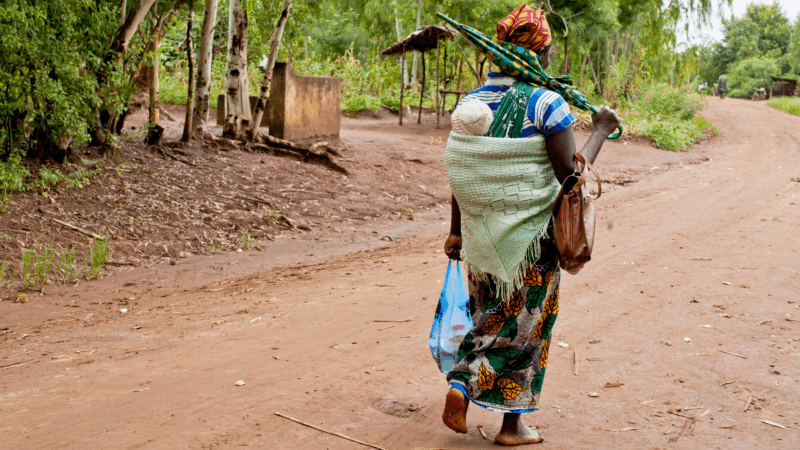Babies take a lesson from soldiers in the war against malaria
Babies may soon join soldiers in the fight to ward off malaria.
For years, the U.S. military has treated uniforms with insecticide to repel mosquitoes and the malaria they can transmit. Ross Boyce used to wear one before becoming an infectious disease physician and malaria researcher at the University of North Carolina at Chapel Hill.
He wondered if babies could get similar protection – not from a uniform but by treating the baby wraps that many moms in sub-Saharan Africa use to carry their little ones.
“It seems sort of an obvious thing to do,” he says, especially given the risk — nearly every minute, a child under 5 in sub-Saharan Africa dies from malaria. Plus, existing tools like insecticide-treated bed nets can only protect kids while they’re sleeping.
So Boyce and his colleagues tested this idea in a large randomized controlled trial. In a rural part of western Uganda, 200 mothers with kids between 6 and 18 months got a permethrin-soaked baby wrap, while 200 others got a wrap just soaked in water. All participants got a brand-new treated bed net too.
Over the course of 6 months, the young participants visited clinics every two weeks to be checked for malaria symptoms and tested. The team also looked for side effects. Every four weeks, the researchers re-soaked the wraps in case the permethrin wore off. “That was probably overkill,” says Boyce. “But we really wanted to know, if we have enough permethrin in there, does it work?”
The answer: a resounding yes. “It was a level of effect that was beyond even our wildest expectations,” says Boyce.
Over 6 months, 34 kids in the permethrin-wrap group tested positive for malaria, compared with 94 in the water-soaked wrap group, a reduction of about 65%.
“It’s a really large reduction, surprisingly so,” says Thomas Eisele, a malaria researcher at Tulane University who wasn’t involved in the study. The scale of the reduction suggests mosquitoes are biting more often than thought during the daytime, he says.
“We’ve hit a brick wall where we just weren’t making progress with our existing tools,” says Eisele. “These types of interventions are going to be critical.”
The major reductions didn’t seem to come with major side effects over the course of the experiment, which was a worry. Permethrin can cause growth and neurological problems if ingested at high levels.
“When [permethrin] is treated on fabric, there’s much less transmission through the skin,” he says. Plus, kids were generally clothed underneath the wrap, so there wasn’t much direct contact. Still, about 8.5% of babies had a mild rash in the treatment group compared with 6% in the control.
“Nothing is zero risk, and it’s a tradeoff that needs to be considered,” he says, “but we know getting malaria is not good for children either.”
In the real world, retreating the wraps as often as they did during the experiment could be impractical, says Boyce. But it also may not be necessary since manufacturers are able to create long-lasting permethrin-treated garments.
Down the line, Boyce imagines mothers could get a long-lasting wrap when they come to clinics to get vaccines, providing some extra protection before the babies start walking around on their own.
However the rollout might work, demand would be high, predicts study co-author Edgar Mulogo, a researcher at Mbara University in Uganda. “The excitement to use [the wraps] was just tremendous,” he says. He heard one participant say “when the children were under the wraps, they were not getting bitten.”
In this Icelandic drama, a couple quietly drifts apart
Icelandic director Hlynur Pálmason weaves scenes of quiet domestic life against the backdrop of an arresting landscape in his newest film.
After the Fall: How Olympic figure skaters soar after stumbling on the ice
Olympic figure skating is often seems to take athletes to the very edge of perfection, but even the greatest stumble and fall. How do they pull themselves together again on the biggest world stage? Toughness, poise and practice.
They’re cured of leprosy. Why do they still live in leprosy colonies?
Leprosy is one of the least contagious diseases around — and perhaps one of the most misunderstood. The colonies are relics of a not-too-distant past when those diagnosed with leprosy were exiled.
This season, ‘The Pitt’ is about what doesn’t happen in one day
The first season of The Pitt was about acute problems. The second is about chronic ones.
Lindsey Vonn is set to ski the Olympic downhill race with a torn ACL. How?
An ACL tear would keep almost any other athlete from competing -- but not Lindsey Vonn, the 41-year-old superstar skier who is determined to cap off an incredible comeback from retirement with one last shot at an Olympic medal.
Trump promised a crypto revolution. So why is bitcoin crashing?
Trump got elected promising to usher in a crypto revolution. More than a year later, bitcoin's price has come tumbling down. What happened?







